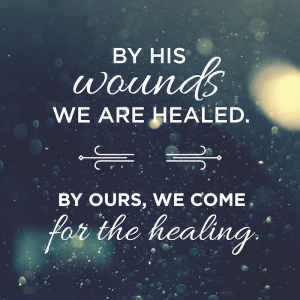It’s easy to get bogged down in the middle and forget where you started.
Two chapters and 17 months into The Colossians Project, and the Apostle Paul still sits by the lamplight in a house prison in Rome, pouring out his heart in Spirit-soaked sentences, writing truth for the insignificant people of the church in Colossae.
He remembers every trial, every chain — his body shackled and shredded for daring to speak the dangerous hope in these words. He has been mocked and scorned and maligned as His Savior was before him. He runs his fingertips over silver scars — holy brands of sacrifice etched deeply into his skin and his soul.
Paul has been wounded on the way to this place, not just by enemies, but by friends as well — by people who hated the truth and by those who claimed at first to love it, only to abandon or twist it when he looked away.
Some cuts haven’t healed just yet.
Yet he pleads with us from the heart of these bruises: For I want you to know how great a struggle I have for you, I rejoice in my sufferings for your sake (Colossians 2:1; 1:24).
I know what it means to be exposed, to be abandoned, to be weak. I know how much the world aches and stings.
But see to it that no one takes you captive, and let no one disqualify you (2:8; 2:18) with false teaching or fake rules, trying to bind up your wounds with this plan or that, convincing you that true healing lies outside of Jesus Christ.
Don’t let anyone tell you it’s on you to stop the bleeding.
These rules — this conventional wisdom — have indeed an appearance of wisdom in promoting self-made religion and asceticism and severity to the body, but they are of no value in stopping the indulgence of the flesh (2:23)
There is a brokenness that leads only to self. Look at me, why me, tell me more about me. But Paul knows that wholeness that leads to self — believing we’re stitching our hearts together by organizing or chastising or medicating — is a far more dangerous thing.
Self-made wholeness looks like wisdom and peace and discipline, but it always ends up empty. It can’t stop us from longing to fill ourselves again tomorrow.
We think we’re free, but the chains cut ever deeper. The skin glows, but the flesh underneath rots away.
But the true hope keeps Paul up at night, after 25 years of beatings and bruises, writing feverishly to strangers and singing the praise of the wounds that carry us to the wholeness of Christ:
And you, who once were alienated and hostile in mind, doing evil deeds, he has now reconciled in his body of flesh by his death, in order to present you holy and blameless and above reproach before him (1:21-22).
And you, who were dead in your trespasses and the uncircumcision of your flesh, God made alive together with him, having forgiven us all our trespasses, by canceling the record of debt that stood against us with its legal demands. This he set aside, nailing it to the cross (2:13-14).
We must stake our souls on a theology of brokenness, not wholeness. God’s heart is for the hurting — His ransom is for the captive — His resurrection is for the alienated, the hostile, the damaged, the indebted, the dead. Brokenness is built into the system.
For our all-powerful, all-knowing, all-victorious God did not rescue us through noisy triumph.
He rescued us through quiet affliction.
He was pierced. He was crushed. He poured out His soul unto death. (Isaiah 53:5, 12).
Jesus was broken to save us.
And we must know we are broken to be saved.
So let us thank God for the days we are not well in our own ways — for the moments we do not measure up — for the heartaches that bleed us into desperation for our Jesus.
By His wounds we are healed.
By ours, we come for the healing.
—–
Halfway done. If you’re on my email list, reflections on the project so far are on their way to you tomorrow.



0 Comments